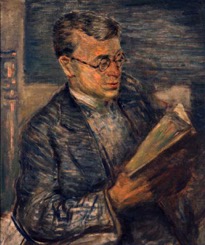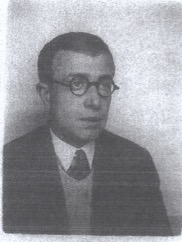Meyer Rozenblum (ca. 1900-1942)
23 July 2013


Left: Courtesy Magnes Collection, University of California; gift of Ephraim Margolin.
Right: 1938 photograph courtesy Nelly Levin, Tel Aviv, Israel
An interesting portrait of the scholar and teacher Meyer Rozenblum by Lejzerowicz can be found in the University of California’s Magnes Collection of Jewish Art and Life in Berkeley. Rozenblum - called “Blum” by some of his young students in the 1930s - scratched out a meager living by teaching and tutoring. An avid chess player and Yiddish-language poet, Rozenblum was first and foremost a scholar. He was a friend of the Margolin family and belonged to their circle, having gone to school with the writer Julius Margolin. This may explain why the Margolin-Spektor family commissioned his portrait in the 1930s. In one of his books, Julius Margolin remembered Rozenblum with great affection, even though he and his friends criticized him for his passivity: “He was a complete being, faithful to his principles, incapable of compromise, hypocrisy, or lies, a free being who refused to let himself be regimented. He couldn’t belong to any party and no need would have made him accept working in an office: it would have been in contradiction with his profound self. Notwithstanding his absolutely carefree attitude, his lack of energy and ambition that was revolting to his friends, he was one of those gentle obstinate people who live by their own lights, who don’t allow themselves to be manipulated, one of those people who are the most untamed in their day-to-day humanity. . . . He led a difficult life. His activities as a teacher seemed to anguish him and to revolt him; he showed a total lack of interest in his students. But in spite of that, an atmosphere of sympathy and friendship, which he didn’t in any way foster, surrounded him. It was enough for him to just be himself: a man of an absolute independence of spirit who stood for a kind of authentically Jewish fanaticism and Innerlichkeit [introspective nature]. He annoyed us, we criticized him, . . . but we couldn’t do without him.”
Margolin reports that, having escaped from Łódź to Pinsk on the Soviet side of the border created after the German and Soviet invasions of Poland in September 1939, Rozenblum eventually decided to accept a Soviet passport and took a job in May 1940 as a French teacher in a lyceum in Krzemieniec (now Kremenets, Ukraine). After the German invasion of the Soviet Union, he was murdered along with the other Jews in Kremenets in August-September 1942.
[Julius Margolin, Voyage au pays des Ze-Ka. Traduction du russe par Nina Berberova et Mina Journot, révisée et complétée par Luba Jurgenson. Paris : Le Bruit du Temps, 2010, p. 88. English translation from the French translation: William Gilcher, July 2013.]